Sun Lounge (railcar)
| Sun Lounge | |
|---|---|
 The lounge area of the Hollywood Beach Sun Lounge. | |
 Postcard of a Sun Lounge interior in the 1960s. | |
| Manufacturer | Pullman-Standard |
| Constructed | 1956 |
| Entered service | 1956–1981 |
| Number built | 3 |
| Number preserved | 2 |
| Number scrapped | 1 |
| Diagram | 4202 |
| Fleet numbers | 18–20 (SAL) 6500–6502 (SCL) 3230–3232 (Amtrak) |
| Capacity | 5 double bedrooms |
| Operators | Seaboard Air Line Railroad Seaboard Coast Line Railroad Amtrak |
The Sun Lounges were a fleet of three streamlined sleeper-lounge cars built by Pullman-Standard for the Seaboard Air Line Railroad in 1956. The cars featured a distinctive glazed roof area meant to capture the ambience of a dome car in a lower profile, as tunnels on the East Coast of the United States prevented the use of dome cars there. The Seaboard employed all three Sun Lounges on its flagship Silver Meteor between New York City and Miami, Florida. The cars later saw service with the Seaboard Coast Line Railroad and Amtrak. Two of the three survive in private ownership.
Design
The first successful dome design in the United States was the "Vista Dome", which began test runs in 1945. The Chicago, Burlington and Quincy Railroad ("CB&Q") rebuilt a stainless steel Budd-built coach in their shops in Aurora, Illinois, with the Vista Dome design imagined and sketched by Cyrus Osborn. The dome area featured seats positioned lengthwise in the cabin facing double-pane windows which were designed to improve insulation.[1]: 197 While popular with travelers, dome cars could not be used on most railroads in the Eastern United States because of the low clearance on various tunnels.[2]: 39 Even the low-slung "Strata-Domes", designed by Pullman-Standard for the Chesapeake and Ohio Railway, could not travel north of Washington, D.C.[3]
The concept of a "sun lounge" or a "sun parlor" was not new in railroading. The Illinois Central Railroad's Panama Limited, introduced in 1911, included a "sun-parlor" observation car, with wrap-around windows and a mahogany interior.[4]: 21 In 1931 the Seaboard itself added a "lounge sun-parlor car" to the Southern States Special, one of its New York-Florida trains.[5]
The Seaboard turned to Pullman to design a sleeper-lounge which captured the ambiance of a dome car in a single-level car. The resulting Sun Lounge was split into two parts. At one end were five double bedrooms. At the other was a lounge for use by sleeping car passengers on the train.[6]: 102 The lounge was unique, enclosed by large picture windows and glass windows on the roof, creating the effect of a dome without a dome. The lounge interior included such Floridian touches as light fixtures made of driftwood.[7]: 66–67 In contemporary advertising the Seaboard touted the Sun Lounges as "unlike anything on the rails at present."[8]
Service history
Pullman delivered three Sun Lounges to the Seaboard: Miami Beach, Palm Beach, and Hollywood Beach. All three entered service in 1956 on the Silver Meteor.[9]: 159 When the Seaboard merged with its rival the Atlantic Coast Line Railroad in 1967 to create the Seaboard Coast Line Railroad the cars remained in service but were renamed, becoming the Sun View, Sun Beam, and Sun Ray, respectively. Amtrak inherited all three lounges in 1971. It retired Sun View in 1977; Sun Beam and Sun Ray in 1981. None of three were converted to head-end power under the Heritage Fleet program.[10]: 129
The Sun Beam (Palm Beach) was scrapped at Naparano Iron & Metal Company in Newark, NJ in the early 1980's. A picture of the lounge portion of the Sun Beam was in the Dec 88 issue of Passenger Train Journal. The other two cars are privately owned.[11]
References
- ^ White, John H. (1985) [1978]. The American Railroad Passenger Car. Vol. 1. Baltimore, Maryland: Johns Hopkins University Press. ISBN 978-0-8018-2722-8.
- ^ Sanders, Craig (2003). Limiteds, Locals, and Expresses in Indiana, 1838–1971. Bloomington, Indiana: Indiana University Press. ISBN 978-0-253-34216-4.
- ^ "Dome Cars Due On Florida Special". Palm Beach Post. November 21, 1965.
- ^ Dubin, Arthur D. (March 1963). "The Panama Limited" (PDF). Trains. 23.
- ^ "New Parlor Cars Operate To City". Evening Independent. January 7, 1931.
- ^ Schafer, Mike; Welsh, Joe (1997). Classic American Streamliners. Osceola, Wisconsin: MotorBooks International. ISBN 978-0-7603-0377-1.
- ^ Johnston, Bob; Welsh, Joe; Schafer, Mike (2001). The Art of the Streamliner. New York: Metro Books. ISBN 978-1-58663-146-8.
- ^ "Sun Lounge Sleeping Cars and Center-Lounge Coaches for your Seaboard Trip to Florida and the South!". Sunday Herald. November 13, 1955. Retrieved 2014-05-17.
- ^ Welsh, Joe; Bill Howes; Kevin J. Holland (2010). The Cars of Pullman. Voyageur Press. ISBN 0760335877. OCLC 401715735.
- ^ Simon, Elbert; Warner, David C. (2011). Holland, Kevin J. (ed.). Amtrak by the Numbers: A Comprehensive Passenger Car and Motive Power Roster – 1971–2011. Kansas City, Missouri: White River Productions. ISBN 978-1-932804-12-6.
- ^ "SAL-Seaboard Air Line". Retrieved 2014-05-24.
External links
 Media related to Sun Lounge (railcar) at Wikimedia Commons
Media related to Sun Lounge (railcar) at Wikimedia Commons
